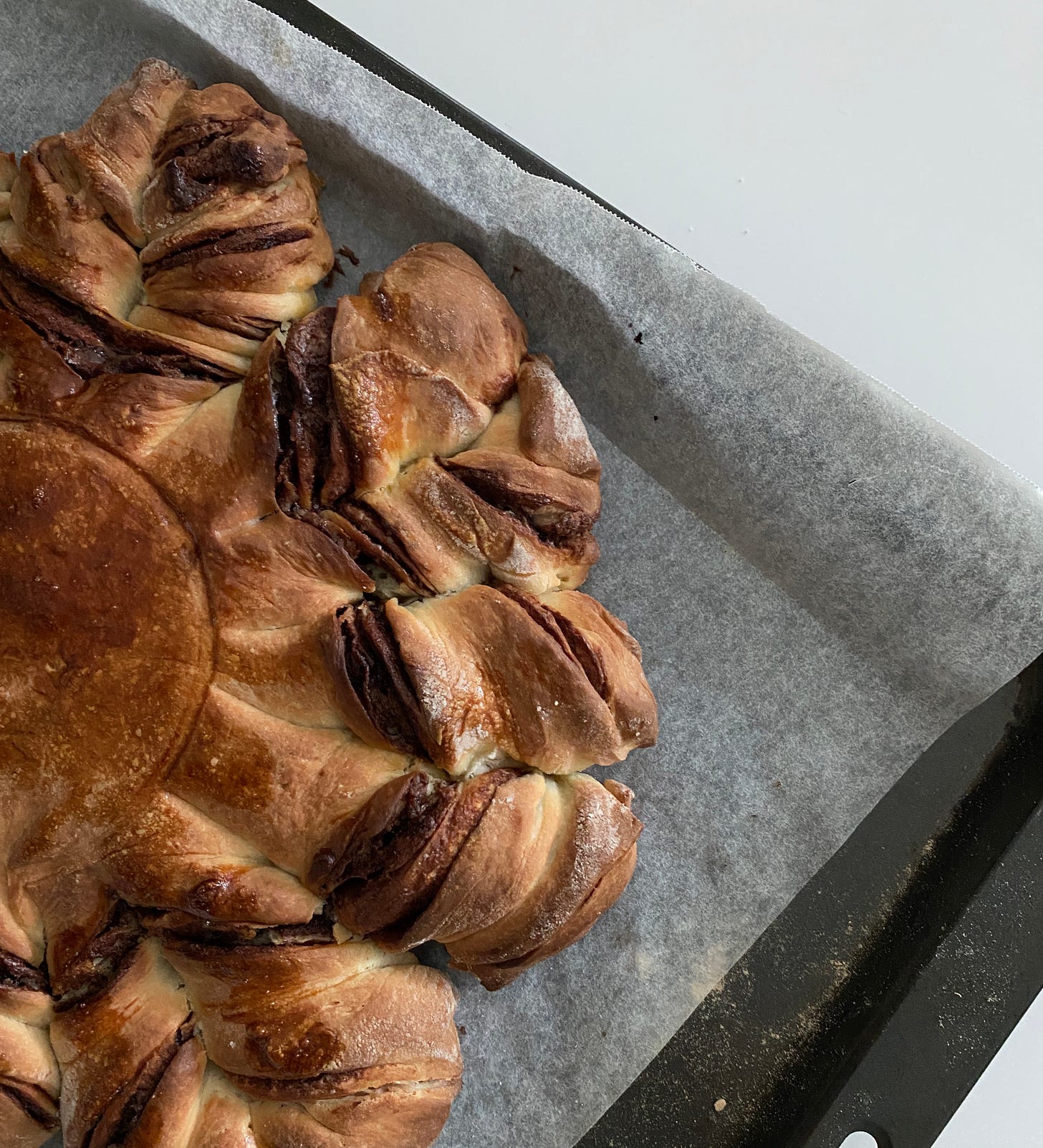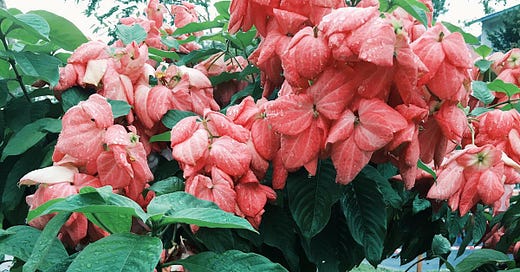Hi friends,
We hope this newsletter finds you in a comfortable, pajama-clad state.
This week, as told through a recent history of Google Searches:
J:
“Terms for groups of animals” - some standouts: a parliament of owls, a fever of stingrays, a pandemonium of parrots.
“How to tell if yeast is working” - this week marked a bold departure from the comfortable world of banana bread and into the scary, unfamiliar territory of leavened carbs. My first creation - a nutella-stuffed star bread - was a mild (albeit, slightly burned) success
“Timothee Chalamet dancing” - do I even need to explain myself?
Pictured: the star bread in question (alt caption - a star(bread) is born)

N:
“How to know if you caused a flat tire”: due to my inability to turn around curbs :(
“What is the evolution of pokemon Diglett”- utterly embarrassing that I couldn’t recall the name (it is Dugtrio) - I think it’s the perfect representation of me and my brothers.
“EASY spaghetti bolognese recipe”: turns out, the bolognese was *chefs kiss* but we managed to overcook the pasta disastrously.
Trevor, Lola and I as Dugtrio - the resemblance is uncanny:

Earlier this week, we launched a new sub-segment that we’re calling “Kopi Candids”: the idea is that readers can send us prompts - a burning question, a favorite word; a picture, even - and we respond. This week, we received the word “stability” from Franny (hi!).
Stable: (of an object or structure) not likely to give way or overturn; firmly fixed.
When thinking about this word, the irony doesn't escape us - stability is one of the many things that are in short supply right now. But instead of the uncertainty of the world around us, we wanted to write about the stability of the interior self.
We’re not going to lie - this week was a challenge to say the least. We knew that there were ways that Kopi Club would push us, and it certainly was difficult to land on the right words to describe our thoughts. We don’t want to pretend that writing always comes easy, but we stuck it through and hope you enjoy.
J: Since I joined Instagram in seventh grade (back when the toughest decisions were choosing between the Toast and Valencia filters), my biography has been through a series of intense iterations. I've quoted every Hugh Grant movie under the sun (re: surreal, but nice) and joined the masses in flaunting my dependence on caffeine; I've even felt the need to declare my favorite font (Garamond, btw). After a fair share of genuinely unfollow-worthy bios, I landed on a one-liner that pretty much sums me up: "is a creature of extreme habit".
If my first year of university was a failed experiment in balancing an erratic sleep schedule with a course load I definitely underestimated, it seems that every subsequent year at Penn has been dedicated towards finding stable ground - maybe, even, to the point of overcompensation. As a junior, I sank so deep into routine that I started to conflate repetition with stability.
It occurred to me recently that stability and sameness - though not mutually exclusive - are also not interchangeable. In the last month, I've overdosed on the latter whilst craving the former. For example: it takes a week to write these newsletters, and I have worn the same two shirts in that time frame. Every afternoon, I've replayed the same playlists so many times that I can hum the next song before the current track ends. I cook the same breakfasts, reread the same books, and stay up late worrying about the same thoughts. In quarantine, there is no shortage of sameness.
And while a little routine helps, it is also no replacement for a real sense of stability. I am grateful for its comfort, its structure - more than ever, routines are one way of making sense of all this empty time. But neither can they pacify the internal turmoil. I am realizing that stability doesn’t mean I must stop things from changing; it just means I am coming to peace with the fact that they are bound to.

I joke about doing things "just to feel something again": dressing up as if I had an important event to attend, or creating Google Calendar reminders to mark the most insignificant tasks (ie. “check oven”). I guess it’s true when they say old habits die hard. Looking back on this past year, I retrace the routines I’ve committed to memory and notice the small surprises. Like the way walking the same four blocks to class makes me pay attention to the changing sky, or dropping by my favorite coffee shop and waiting to see who will be manning the bar today. Maybe what I value most about these old habits is not the ways in which they created sameness, but their ability to allow me to appreciate change, however small.
N: Nearby my home, there is a man who hugs a tree every evening before dusk. You can spot him from a distance, arms encircling bark. He is about 70, with a head full of white hair. He presses his forehead against the tree as if by doing so he will absorb the tree's essence. I want to ask him why he hugs the tree, but I don't think I have the right to. From time to time, I look out my window for tree-man and hope he is doing well.
The nice thing about quarantine is that I've started to recognize people on my daily walks, even masked. The little girl on a rusty, rugged mountain bike. The man who speed walks with a ridiculously huge set of headphones on, always on some business call. I see all these familiar-strangers and wonder if I will ever be able to gather the words to convey their wonderful individuality.
I thought I knew myself really well before college but I barely knew myself more than those strangers on my walks. I have changed so drastically in such short periods of time that I’ve often wondered what the ‘stable’ self is - when internal calmness will arrive. More generally, I wonder whether I’ve found my true ‘writing self’ yet. Often, I find myself slumped on my bed hating and feeling tethered down by my narrative voice. I’ve asked myself a million times, why do I feel stagnant? I’ve been frustrated at how my writing has failed to become measurably better over the years.
In times like these, I bring myself back to why I started writing in the first place: because it allows my thoughts to emerge through the act of doing. It forces me to compose myself and articulate the messy strands of ideas in my mind. It stabilizes me. I know that growth can be imperceptible and quiet. I’ve accepted that. Eventually progress loses its shine of exponential improvement simply because as each year goes by, each year becomes a smaller fraction of life in its entirety. There’s nothing to feel too bad about. Maybe the changes are incremental, but important. Maybe the emotions are softer, gradual, more profound.

Stability to me is having the strength to accept change, large or small, with delight and grace. Stability to me is holding the pen and starting to write - even if the words are incoherent. It is relaxing the posture of things that used to be held rigidly; knowing that our current self is separate from our younger self, even though the past often feels like the standard to which we are defined.
I went on a walk the other day to think over what I was going to write this week and I passed by tree-man, who hugged a mahogany with the same earnestness he had when I first saw him months ago. The grass had grown since I had seen it last. I smiled to myself and noted down the observation. I’d find the right words later.
a final note
Nicole’s brother was learning geography in the living room and asked her what an ‘estuary’ was. Estuaries are buffer zones between land and sea. Even nature tells us that any transition is difficult; that we need the time and space for change.
What we found so relevant about estuaries is that erosion can often be the prelude to growth. For us change necessarily means letting in new things not with fear or doubt, but with anticipation.
Hugs,
J & N


